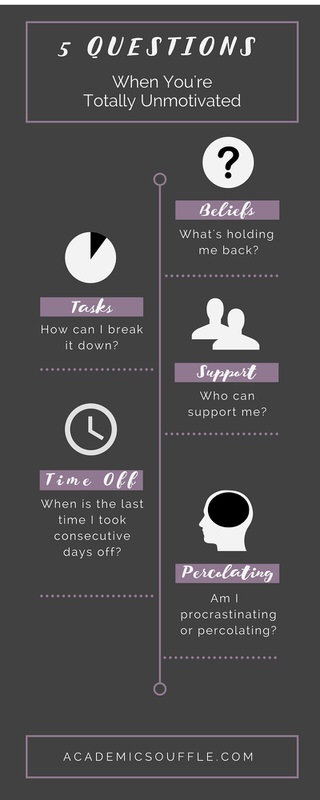The Career Series: 5 Questions to Ask Yourself When You’re Totally Unmotivated

Hands up: who’s not motivated to finish a current writing project? I’m guilty of being especially distracted in the summertime (squirrel!…patio!). As a writing coach, part of my role is helping academics figure out what’s holding them back and working together to formulate a plan to get where they want to be. In this article, I’m going to take a coach’s perspective on your writer’s toolbox and provide you with 5 questions to ask yourself when you’re stuck and unenthusiastic with your writing. Let’s begin!
First, what’s holding me back?
It took me forever to press send on the first draft of my dissertation proposal. I just couldn’t muster the energy to get it done. In hindsight, the biggest barriers to finishing the proposal were assessments: unfounded beliefs that my committee would judge me harshly, even disapprove of me as a person once they saw my incompetence. Yikes! In reality, they were incredibly supportive and wanted me to succeed.
Consider spending some time, even 5 minutes, to get quiet and explore what’s going on internally. What’s the real reason you’re unmotivated? Are you bored? Exhausted? Is this writing project really difficult? Do you fear the wrath of reviewers? This might seem obvious, but the strategies you use to stay motivated should flow from this new awareness. If you need a little guidance going inwards, try the Mood Meter, Buddify or Calm apps. Once you get some insight, commit to taking one small action to address it. Although I’m still a work in progress when it comes to imposter syndrome, more self-reflection back in the day would have saved me months of suffering.
How can I break it down?
There’s great evidence-based strategies and suggestions for staying motivated out there, particularly from Piers Steel from the University of Calgary (my alma mater). One key strategy he emphasizes is breaking down your project into smaller, manageable bits. Instead of working on “your dissertation” today, could you work on 1 paragraph in a single chapter instead? The topic sentence of that 1 paragraph? By setting and completing multiple smaller goals instead of one big goal, you will more frequently see and experience progress…which can be super motivating!
Who can support me?
I’ve seen amazing things happen when academics lift each other up. Do you have a go-to person or group that can help you stay accountable and boost your spirits? In their study of people’s most productive days, Amibile and Kramer found that people were positively triggered by catalysts (which could be a helpful person) and nourishers (such as verbal encouragement). Supportive relationships can range from in-person or virtual writing groups to phoning a friend at the same time every week to sharing a workspace. What would a supportive relationship look like to you?
When is the last time I took consecutive days off?
Let me clarify: when is the last time you spent 2 days in a row without checking email, writing, reading papers, or working on your laptop (multitasking with Netflix doesn’t count)? For many of us, we write in stolen time between committee work, meetings, and teaching—not to mention our personal lives or part-time work. If you’re working crazy hours out of pure passion, go for it and ride this season of productivity.
If you’re starting to feel resentful or exhausted, however (which is the case for many academics I know), consider if taking a couple days off could give you a fresh perspective on your work, and renewed motivation and brainpower to keep going. When I start to see diminished returns on writing hours or have a constant zombie stare at the blinking cursor, I know it’s time to pack it up and take a brain vacay over the weekend.
Am I procrastinating or percolating?
I borrowed this phrase from one of my favorite coaches, Nisha Moodley, who perfectly expressed what I had been trying to say for years. If you’re not avoiding your writing (procrastination) but the words aren’t coming, perhaps something else is going on. I have seen numerous students distressed because they weren’t progressing in their writing goals, particularly during phases of data analysis or when writing a discussion or introduction section.
This kind of intellectual work requires percolating: the gradual process of exploring your topic. I believe that giving your paper a little space and stewing in your thoughts is necessary for critical and creative thinking. Percolating might happen while you’re reading or having a conversation with a colleague about the work. The important thing to recognize is when you’re in this mindset versus stalling and avoiding that happens with procrastination. Just because the words are forming doesn’t mean that important work isn’t happening!
What’s one step you can take right now towards finishing your writing project?

J ill Norris is an award-winning certified coach, health researcher, and educator. She specializes in scientific writing and knowledge synthesis, and works with academics to become more effective in work and life. You can find her at academicsouffle.com or @AcademicSouffle.
ill Norris is an award-winning certified coach, health researcher, and educator. She specializes in scientific writing and knowledge synthesis, and works with academics to become more effective in work and life. You can find her at academicsouffle.com or @AcademicSouffle.
